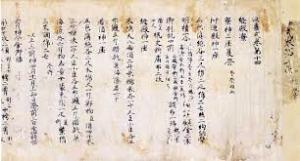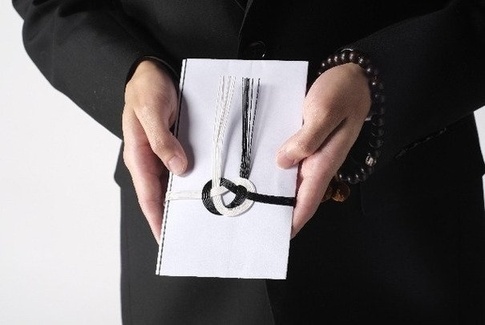
Tenth-century ‘Engi shiki’
Taboo words
Japan has a long tradition of verbal taboos. For example, one Edo-period Shinto funeral text includes a list of seven taboo words that must not be uttered during a period of mourning. Buddhist words are avoided, and neutral or negative terms are substituted. For example, for the word “sûtra” substitute “dyed paper” (Buddhist sutras were written on paper than had been dyed yellow).
These seven taboo words are found in the Heian- period Engi-Shiki, where they are listed as taboos for imperial princesses consecrated to the Ise Shrine. In addition, the Engi-shiki gives seven other “outer” taboo words concerned with death (e.g., for “death” say “to get well”), and so forth.
Nowadays, the Japanese person who observes the Engi-shiki verbal taboos is rare indeed. But people who attend a Shinto funeral, whether as relatives or guests, should avoid a modern set of taboos words. As in the Heian period, the principle is clear: do not utter Buddhist words in a Shinto context. Few people will know the inauspicious utterances beforehand, but etiquette books provide guidance.
The Heisei (not Heian) taboo words include: jôbutsu (“to become a Buddha,” meaning “to die”), meifuku (“happiness in the afterlife”), meido (the afterlife), and ekô (“transfer of merit”). Substitute words are kyusei (“to pass away”), kiten (“return to heaven” ), and takai (“the other world”).
A Buddhist funeral dictionary, addressing a readership of Buddhist priests, suggests that it would be impolite for a Buddhist priest to utter Buddhist words at a Shinto funeral but it is all right to chant nembutsu or daimoku under his breath.
Finally, the word sai is used for the rituals that comprise a Shinto funeral and for the funeral itself. In contrast, the Buddhist funeral is sôshiki. Sai, the same word as matsuri (“festival”), has a Shinto “feel” to it.
Japanese ritual occasions usually entail a gift of cash that has been enclosed in a ceremonial envelope. Etiquette books provide detailed guidelines on who should give how much to whom — and what to write on the envelope. It is taboo to use Buddhist language for the cash gift at a Shinto funeral. For a Buddhist wake or funeral, the guest should write on the envelope o-koden (“for incense”) and the bereaved family should write o-fuse (“donation”) on the envelope containing the payment to the priest. The Shinto substitute are tamagushi ryô (“tamagushi funds”) for the guest’s cash gift and o-harai-ryô (“purification funds”) for the payment to the Shinto priest.

courtesy quora.com

Leave a Reply